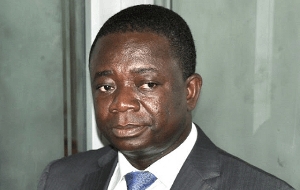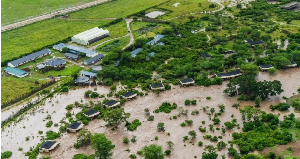General News of Monday, 24 April 2006
Source: Mining and Mineral Engineering Students Association, UMaT, Tarkwa
Government Urged to Refine Mining Policies
Mr. Henry Antwi, an Australian based Mining Engineer and Mineral Economist has urged the Ghana Government to refine and implement policies and initiatives to maximise the discovery and development of mines on a basis that ensures ongoing economic benefit to communities and investors, without compromising internationally acceptable standards in employment, safety, environmental and other cultural related issues. Mr. Antwi was speaking to Students, Lecturers, Mining Professionals and the Media at the second biennial alumni lectures of the University of Mines and Technology in Tarkwa on the topic ?The Mining Industry : a Catalyst to Economic and Social Development.? The Mining Expert emphasized the need to establish mechanisms for the communication of information regarding the environmental impacts of mining operations, associated hazards to surrounding communities and the environment, and control measures implemented by companies to redress any potential problems. These should be communicated to the communities in a culturally appropriate manner, Mr. Antwi said. Despite the fact that the global mining industry is tiny in comparison with the total market capitalisation of the world stock markets, Mr. Henry Antwi emphasized that the essential nature of the products from the mining industry allows the functioning of most sectors of the global market, from transport to manufacturing and from construction to electronics. Mr. Henry Antwi used the concept of ?Input-Output multipliers? to demonstrate the impact of the expenditures of the mining industry, and the additional spin-offs created by the industry?s activities. He said the direct economic impact of a mining project may not be significant, but when viewed from an overall regional economic perspective, it can have significant overall benefits. This is because mining employees spend part of their wages on various goods and services and therefore generate induced impacts. Mining companies also purchase inputs from other businesses and generate indirect impacts. Mr. Antwi emphasized that Ghana needs an open-minded receptivity to different perspectives and a willingness to work for the harmonization of the different cultures. He reminded his colleagues in the mining industry that community expectations for environmental protection in Ghana are increasing. The environment, lifestyle, education and health are all major issues that the industry needs to take account of, in conjunction with traditional leaders, local communities and the government, when planning new mining developments.
Mr. Henry Antwi called on mining companies to establish voluntary codes of responsibility and reach out to communities to set up workshops and roundtables for discussion and dialogue. He elaborated on recent events in Ghana and other countries which point to a growing recognition that the public is disenchanted with the mining industry. He said misunderstanding between communities and mining companies reinforce the legacy of mistrust. Mining Companies should therefore conduct their activities in a manner that recognizes the needs of society, economic prosperity and a healthy environment. They need to be committed to integrating social, environmental and economic principles in mining operations from exploration through development, mining, reclamation, closure and post closure activities. On investor confidence, Mr. Antwi mentioned that Ghana was ranked sixth with a score of 15.2 in a world investment risk survey and was the second African country in the top ten ranking. Ghana?s favourable geology, rule of law and transparent regulations underpin a general improvement in the perception of risk. Accordingly, there is goodwill towards investments in the mining sector in Ghana. Mr. Antwi therefore urged the government to strengthen institutions such as the Environmental Protection Agency, Mining Inspectorate and the Minerals Commission to better perform promotional, monitoring and regulatory roles. He also called on the government and mining companies to strengthen the infrastructure base of the University of Mines and technology to position it as a skills development, research and innovative centre for the mining industry.
As a prelude to Mr. Antwi?s presentation, Ms. Amma Ahenkorah, an Australian based Financial Analyst discussed the contribution of mining towards Gross Domestic Product, Exports and Employment in Australia and Ghana. She mentioned that the mining sector in both Ghana and Australia accounts for about 5% of total GDP. GDP aside, the mining sector also generates significant export revenues. In Ghana it accounts for approximately one third of all export revenues. In fact in 1992 Gold overtook Cocoa as Ghana?s chief export while exports from mining have increased by about 175% over the past 10 years in Australia, she said.
In a keynote speech, The Minister of Lands, Forestry and Mines, Prof. Fobih mentioned that the University of Mines and Technology has been adopted by the African Mining Partnership as one of its centers of excellence for human resource development for the mining industry in Africa. He mentioned his Ministry?s effort to encourage further processing of minerals. Prof. Fobih also spoke about the new Minerals and Mining Act 2006, Act 703.
Mrs. Victoria Bleppony, a Mining Engineer and Mineral Law Expert spoke on the topic ?The Competitiveness of the Ghanaian Minerals & Mining Law in Attracting Foreign Investment?. Mrs. Bleppony emphasized that attracting foreign direct investment into the minerals sector has, since 1986, been a key objective of Ghana?s mineral policy. She said in the period 1986-1996, Ghana was among the three dominant recipients of Direct Foreign Investment (DFI) in Sub- Saharan Africa. The other two countries were Angola and Nigeria. DFI in Ghana increased from US$ 15 million in 1990 to US$ 233 million in 1994. Ghana is also included among three nations ? the others being Chile and Indonesia ? that could be considered as pioneers and pace-makers in using modern mineral investment law to revamp their hitherto state-owned and stagnating mining industries. These countries have not only enacted and successfully implemented contemporary and promotional mining legislation but have also formulated policies resulting in substantial gains. These gains can be clearly quantified in terms of the mineral investment inflow to the respective countries, mining production, mineral export earnings as well as mineral taxes.
Mrs. Bleppony observed that in spite of the enormous contributions made by the existing minerals and mining legislation in the form of an attractive incentive package in promoting foreign investments? access to mineral rights, the attractiveness has been waning for sometime now. Apart from the fact that there was diversion of foreign investment inflow to other African mining countries such as Mali and Tanzania, the downward trend in foreign investment inflow to Ghana could be chiefly attributed to observed flaws in the legislation. These include, but not limited to, the use of discretionary powers in the grant of mineral rights, lack of stability agreement clauses, confusion over who has the right to issue water rights to a mineral right holder, and of a modern mining cadastre.
Mrs Bleppony spoke about the purpose of the government?s new Minerals and Mining Law, which is meant to revise the existing Minerals and Mining Law, 1986 to, among others, reflect new thinking and development in the mining industry. She said when the law was enacted in 1986, it was hailed as one of the best enactments on the subject in Africa and made Ghana an attractive destination for mineral investments. After nearly two decades of operation of the law, however, it has been realised that it requires a revision to reflect international best practices as well as to reposition Ghana as a major mining investment destination in Africa.
Speaking on Contract Mining in Ghana, Mr. Peter Amponsah Mensah, Technical Project Manager at AngloGold Ashanti, Obuasi, outlined one of the benefits of contract mining as the ability of contractors to quickly deploy modern equipment and specialist work force. He said this addresses skills, staffing and equipment shortages. Mr. Peter Amponsah Mensah also spoke about the impact of contract mining on Ghana and employment creation opportunities.










